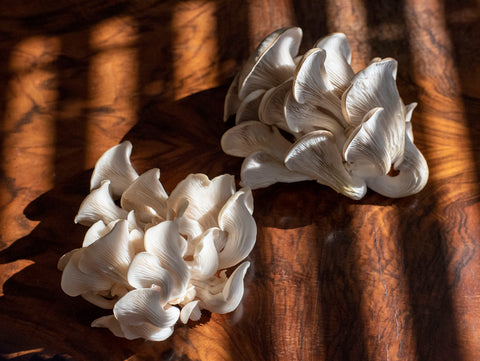The Power of Functional Mushrooms
I just came back from the inaugural Mushroom Summit in Denver, Colorado where I spent two days with other mushroom enthusiasts discussing the many benefits of functional mushrooms. One of the panelists, Sarah-Kate Boylan, founder of Lily’s Lighthouse, a nonprofit focused on helping cure children with epilepsy using functional mushrooms, told us the story of her daughter who was born with severe epilepsy and suffered from up to 50 seizures a day starting when she was only a few months old. After seeing multiple neurologists who were unable to stop her seizures, someone recommended trying medicinal mushrooms. Desperate for a cure, Sarah-Kate started giving her daughter a combination of Lion’s Mane and Reishi powder daily, and the seizures soon completely stopped. I was so moved by Sarah-Kate’s story and her daughter’s impressive recovery that I was inspired to write a post to share some of the other benefits of medicinal mushrooms.
Below, I focus on the health benefits of the top five functional mushroom strains — Reishi, Cordyceps, Lion's Mane, Turkey Tail, and Chaga. These five mushrooms are not only the most widely used in traditional medicine, but also some of the most clinically studied strains, making it easier to discuss their benefits.
Reishi

For centures, reishi mushrooms (Ganoderma lucidum), also known as Lingzhi, were used in traditional Chinese medicine. In the last 20 years, new research has confirmed their benefits. For example, in one study, 96 patient volunteers who took 1.5 grams/day of reishi mushroom extract for 12 months had a decrease of about 40 percent in the size of precancerous adenomas in the colon compared with an increase of about 73 percent in those receiving a placebo (1). A group of 5 studies in a Cochrane Systematic Review focused on 85 patients with lung cancer, and found that when combined with chemotherapy, those receiving reishi generally had a more favorable response to treatment by about 25 percent (2). Another study found that the consumption of reishi extract (225 mg/day) enhanced levels of antioxidant enzymes in the blood and significantly reduced hepatic markers for liver stress and inflammation, such as GOT and GPT. The author also reported a reversing effect in mild fatty liver conditions of the patient volunteers (3). Another randomized, double-blind, placebo-controlled study was conducted with 123 patient volunteers who had neurasthenia, which is a general term for a stressed-out or weakened nervous system that involves symptoms of fatigue, headache, irritability, and other mood-related symptoms. Half of the volunteers were given 1,800 mg of reishi three times daily for eight weeks while the other half received a placebo. The study found that that the reishi group experienced an improvement of 51.6% in well-being and fatigue compared to only 24.6 % in the placebo group (4). Other studies have found reishi mushrooms help regulate cholesterol, blood pressure, and blood sugar levels, and that they inhibit tumor growth, activate immune function, and have a whopping 54 percent beta-glucan content by dry weight. These mushrooms are an absolute powerhouse.
Cordyceps

These little mushrooms were made wildly popular by the show, The Last of Us. Just like in the show, cordyceps are known for their unique lifecycle infecting and eventually replacing the tissue of insects, such as caterpillars, as their host. But don’t worry -- this fungus cannot infect humans. Insects have a much lower body temperature and a much simpler set of internal organs than humans that make it possible for this fungus to thrive. There are two type of cordyceps mushrooms: cordyceps sinensis and cordyceps militaris. Cordyceps sinensis are found in the wild growing on insects, and they tend to be very rare and worth their weight in gold. Most (if not all) cordyceps supplements that you find in the U.S. are farm grown and are a more sustainable and effective alternative. Traditionally, cordyceps have been used to boost energy levels and endurance during sports, increase sexual vigor, protect against kidney disease, and help patients with asthma and other bronchial inflammation. Cordyceps contain various bioactive components, including the most vital, cordycepin, which is a powerful molecular circadian clock resetter. Cordycepin also displays cytotoxicity against some leukemic cell lines in vitro, and has been shown to have positive effects in some types of other cancers, such as lung, renal, colon, and breast cancer (5). Another recent controlled study involving 98 patient volunteers with chronic kidney disease found that taking 100mg a day of C. militaris for 3 months improved kidney function and slowed the progression of the disease (6).Though cordyceps were used successfully for centuries in traditional medicine, scientific research has just started to crack the surface on the benefits of these extraordinary mushrooms.
Lion’s Mane

Lion’s mane (Hericium erinaceus) is a very unique shaggy mushroom that is not only praised for its medicinal benefits but also for its delicious taste. The reported health benefits of the fruiting body and mycelium include nerve support and repair, mood regulation, and cognitive function improvement. They also counteract gastritis, regulate blood sugar levels, lower blood pressure, reduce inflammation, and are anti-carcinogenic. One of the most important compounds in lion’s mane is erinacine, which has gained significant attention due to its potential neuroprotective effects. Studies suggest that this compound may enhance nerve growth factor (NGF) synthesis, a protein essential for the growth and maintenance of nerve cells. By supporting NGF synthesis, erinacine may help protect and regenerate nerve cells, which scientists believe may help decelerate the progress of diseases like Parkinson’s, Alzheimer’s, and early dementia (7). Additional controlled studies have found that volunteers who were given 1-1.5 grams of lion’s mane daily for 12 weeks had better cognitive functions on memory tests compared with those taking a placebo (8). There is still a lot to learn about this mushroom, but early indications show that this mushroom has a promising roll to play in protecting our cognitive abilities as we age.
Turkey Tail

Named "turkey tail" due to their resemblance to the colorful tail feathers of a wild turkey, turkey tail mushrooms (Trametes versicolor) have also been used for centuries in traditional Chinese and Japanese medicine. These powerful mushrooms are known to support our immune systems and promote overall well-being. Turkey Tail mushrooms contain a very high percentage of beta-glucans, more than 60% by dry weight. Some of the other important active compounds found in turkey tail mushrooms include polysaccharopeptides (PSP) and polysaccharide-K (PSK), which scientists believe have immune-enhancing properties (9). Numerous lab tests and animal studies show PSK can enhance immune functions in profound ways. For example, PSK was first approved by the Japanese ministry for the treatment of cancer in 1977. Studies show that it could extend survival rates for colorectal and stomach cancers by as much as 5-10 years (10). Turkey Tail extract appears to decrease nausea, improve immune functions, and boost energy levels, which counteract some of the major side effects of chemotherapy. In addition, in a small human study and in animal studies, taking whole turkey tail powder or the tea extract lowered LDL cholesterol and increased HDL cholesterol (11). This is another essential functional mushroom to incorporate into your daily routine.
Chaga

Chaga mushroom (Inonotus obliquus) is a type of fungus that grows on birch trees in cold regions, such as Siberia, Canada, and northern parts of the United States. It has been used for centuries in traditional medicine, particularly in Russia and Eastern Europe, and is believed to offer several health benefits. Birch bark, the main host for chaga, contains up to 25 percent betulinic acid. Betulinic acid is known to have a potent cytotoxicity against a variety of cancer types, and many normal cells and tissues have a resistance to betulinic acid, making it more effective as anti-cancer medicine (12). Research findings show that the fruiting body extract of chaga (called sclerotium) can directly inhibit cancer cell growth, while the mycelium extract may increase your immune system’s ability to destroy cancer cells (13). This means taking an extract from both fruiting body and mycelium could be powerful for fighting cancer cells and for prevention. Chaga mushrooms were traditionally used to promote gastrointestinal health. They may have beneficial effects on the gut microbiota, the community of microorganisms living in our digestive system, and could help improve digestion and gut health (14). A few laboratory studies in cell cultures and animals have shown that chaga extracts have antioxidant, blood-sugar-regulating, anti-tumor, and immune-stimulating activity. They don't call it the mushroom of immortality for nothing!
As you can see, the benefits of these five mushrooms are varied and wide, and our research into them is just getting started. Still, we already know enough to put these mushrooms to good use. By using a daily support supplement that is high in Beta-Glucans, and includes extracts from each of these mushrooms, like our Forager’s 14 extract, you can already reap the benefits of these fantastic fungi and give yourself a daily immune boost!



